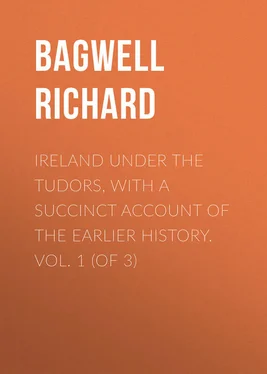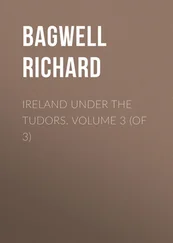Richard Bagwell - Ireland under the Tudors, with a Succinct Account of the Earlier History. Vol. 1 (of 3)
Здесь есть возможность читать онлайн «Richard Bagwell - Ireland under the Tudors, with a Succinct Account of the Earlier History. Vol. 1 (of 3)» — ознакомительный отрывок электронной книги совершенно бесплатно, а после прочтения отрывка купить полную версию. В некоторых случаях можно слушать аудио, скачать через торрент в формате fb2 и присутствует краткое содержание. Жанр: foreign_antique, foreign_prose, Историческая проза, на английском языке. Описание произведения, (предисловие) а так же отзывы посетителей доступны на портале библиотеки ЛибКат.
- Название:Ireland under the Tudors, with a Succinct Account of the Earlier History. Vol. 1 (of 3)
- Автор:
- Жанр:
- Год:неизвестен
- ISBN:нет данных
- Рейтинг книги:4 / 5. Голосов: 1
-
Избранное:Добавить в избранное
- Отзывы:
-
Ваша оценка:
- 80
- 1
- 2
- 3
- 4
- 5
Ireland under the Tudors, with a Succinct Account of the Earlier History. Vol. 1 (of 3): краткое содержание, описание и аннотация
Предлагаем к чтению аннотацию, описание, краткое содержание или предисловие (зависит от того, что написал сам автор книги «Ireland under the Tudors, with a Succinct Account of the Earlier History. Vol. 1 (of 3)»). Если вы не нашли необходимую информацию о книге — напишите в комментариях, мы постараемся отыскать её.
Ireland under the Tudors, with a Succinct Account of the Earlier History. Vol. 1 (of 3) — читать онлайн ознакомительный отрывок
Ниже представлен текст книги, разбитый по страницам. Система сохранения места последней прочитанной страницы, позволяет с удобством читать онлайн бесплатно книгу «Ireland under the Tudors, with a Succinct Account of the Earlier History. Vol. 1 (of 3)», без необходимости каждый раз заново искать на чём Вы остановились. Поставьте закладку, и сможете в любой момент перейти на страницу, на которой закончили чтение.
Интервал:
Закладка:
Brian was henceforth reckoned as monarch of Ireland. He invaded Connaught with a flotilla on the Shannon and an army marching on land, and the chiefs of the western province were glad to give hostages. The Ulster potentates falling out among themselves, the north also was easily subdued, and Brian became the actual lord paramount of Ireland. After this he made a tour round the island, starting from the Shannon and marching through Roscommon and over the Curlew mountains into Sligo. Hugging the coast by Ballyshannon to Donegal, he crossed Barnesmore Gap into Tyrone, and then passing the Foyle, near Lifford, he went through Londonderry, Antrim, Down, and Louth, to the neighbourhood of Kells. In a previous expedition he had visited Armagh and laid twenty ounces of gold on the altar. A fleet, manned by the Danes of Dublin, Limerick, and Waterford, seems to have circumnavigated Ireland while he was making the circuit by land.
The supremacy of Brian was no doubt an extremely loose one. He had made no real impression on the northern tribes, and they only waited a favourable opportunity to cast off the nominal yet galling yoke. But for about seven years there seems to have been no serious attempt against him, and he was able to turn his attention to the building of churches and bridges. It was during this period that a lone woman is said to have walked unmolested from the Bloody Foreland to Glandore with a gold ring at the end of a wand. Peace, however, there was not; for Brian was engaged in at least two warlike expeditions to Ulster, and there was a fair amount of murder and private war among the minor chiefs. Brian had repudiated Gormflaith, Maelmordha’s sister and Sitric’s mother, and probably not without good reason, for her moral character was by no means on a par with her beauty and talents, since she had been married successively to Olaf Cuaran and to Malachi II., and had been repudiated by both. ‘She was,’ says the Saga, ‘the fairest of all women, and best gifted in everything that was not in her power, but it was the talk of men that she did all things ill over which she had any power.’ Brian afterwards married a daughter of the King of Connaught, and when she died, Gormflaith may have sought to be reinstated. At all events she was at Kincora when her brother arrived, bringing with him the tribute of Leinster. Her taunts, and a quarrel which he had with Murrough, Brian’s eldest son, provoked Maelmordha to leave Kincora in anger, and to raise the standard of revolt. ‘Gormflaith,’ says the Saga, ‘was so grim against King Brian after their parting, that she would gladly have him dead, and egged on her son Sitric very much to kill him.’ Sitric readily agreed to Maelmordha’s proposal, and so did the northern Hy Neill, who had never been really conquered, and who at once invaded Meath. After a gallant struggle against Leinster and Ulster, Malachi was overpowered, and called upon Brian for help. The King of Ireland, to whom the men of Connaught remained faithful, accordingly ravaged the country between his own district and Dublin, but was obliged to retire from before its walls for want of provisions. 20
Sitric and Gormflaith made use of the breathing space allowed them to organise a powerful confederacy against Brian. Sitric himself went to Sigurd, Earl of Orkney, who, after many refusals, at last agreed to join, on condition of receiving the Crown of Ireland and Gormflaith’s land. ‘All his men,’ says the Saga, ‘besought Earl Sigurd not to go into the war, but it was all to no good.’ Gormflaith was well pleased at the prospect before her, and advised large preparations for the inevitable struggle.
Sigurd was nominally a Christian, but he reposed his chief trust in the raven banner which his mother had woven with mighty spells; and many Scandinavian warriors were still fanatically attached to Thor and Woden. The Vikings, Ospak and Brodir, were lying off Man, and to them Sitric next addressed himself in person. The Norsemen do not seem to have insisted on youth in their wives, for Brodir was induced to join by the same promises which had been made to Sigurd, and Gormflaith’s first husband had been dead thirty-three years. ‘Brodir,’ says the Icelandic account, ‘had been a Christian man and a mass deacon, but he had thrown off his faith and become God’s dastard, and now worshipped heathen fiends, and was of all men most skilled in sorcery. He had the coat of mail on which no steel would bite. He was both tall and strong, and had such long locks that he tucked them under his belt. His hair was black.’ 21
Ospak, who had leanings towards Christianity, refused to attack Brian; indeed, he went over to him, and, according to Norse accounts, was baptized. An immense force was, however, gradually collected, and Scandinavian contingents are mentioned from Northumbria, under two Earls, from Norway, from Orkney and Shetland, Skye and Lewis, from Cantire, Argyle, and Galloway. Welshmen from Pembrokeshire and Cornwall, Frenchmen, that is in all probability French Normans, under Karl and Ebric, and some Flemings under a knight are also spoken of. Romans even are mentioned, but this may be mere magniloquence. To oppose this motley host Brian had the men of Munster, Meath, and South-eastern Connaught, and the Danes of Limerick and probably of Waterford. He may have had the numerical superiority, for Sigurd told his mother, the wise woman, that he expected to be outnumbered seven to one. The eve of the battle of Clontarf was signalised, according to the annalists, by various supernatural occurrences. A messenger from St. Senanus appeared to the king, and prophesied his death as the penalty due for violating the sanctuary on Scattery Island thirty-seven years before. The interests and prejudices of monastic chroniclers may account for this story, but it is not so easy to explain the firm belief in pagan deities, in fairies, in demons, and in satyrs shown by two independent historians. It is evident that the oracles of heathenism were not supposed to have been dumb more than 500 years after the death of Patrick, and 400 after that of Columba. Nor was there any lack of marvels on the Danish side. Brodir, who had already been plagued by showers of boiling blood, by supernatural noises, by deaths among his men, and by ravens with beaks and claws of iron, ‘tried by sorcery how the fight would go. And the answer ran, that if the fight were on Good Friday, King Brian would fall but win the day; but if they fought before, they would all fall that were against him.’ 22
The battle was fought upon the fateful Friday, and Brian refused to take part in it because the day was holy. He remained in the rear protected by a ring of soldiers with their shields locked together. It was observed that the successive bearers of the raven banner all fell, and Hrafn the red, who was called by Sigurd to the dangerous duty, refused, saying, ‘Bear thine own devil thyself.’ ‘’Tis fittest that the beggar should bear the bag,’ answered the Earl, and put the banner under his cloak. Sigurd fell, and Sitric had to retire before Ospak. Hrafn the red flew to a river into which the devils wished to drag him, but a spoken spell dispersed them. ‘Thy dog,’ he cried, ‘Apostle Peter, hath run twice to Rome, and he would run the third time if thou gavest him leave.’ Of Thorstein we are told that he interrupted his flight to tie his shoe. Kerthialfad, Brian’s foster son, asked him why he lingered at such a critical moment, and the Northman returned an answer worthy of Sparta’s best days – ‘Because I can’t get home to-night, since I am at home out in Iceland.’ 23
Читать дальшеИнтервал:
Закладка:
Похожие книги на «Ireland under the Tudors, with a Succinct Account of the Earlier History. Vol. 1 (of 3)»
Представляем Вашему вниманию похожие книги на «Ireland under the Tudors, with a Succinct Account of the Earlier History. Vol. 1 (of 3)» списком для выбора. Мы отобрали схожую по названию и смыслу литературу в надежде предоставить читателям больше вариантов отыскать новые, интересные, ещё непрочитанные произведения.
Обсуждение, отзывы о книге «Ireland under the Tudors, with a Succinct Account of the Earlier History. Vol. 1 (of 3)» и просто собственные мнения читателей. Оставьте ваши комментарии, напишите, что Вы думаете о произведении, его смысле или главных героях. Укажите что конкретно понравилось, а что нет, и почему Вы так считаете.












